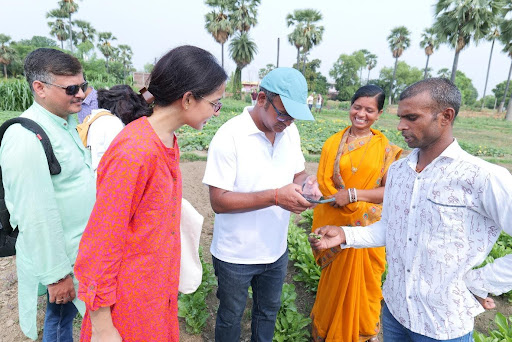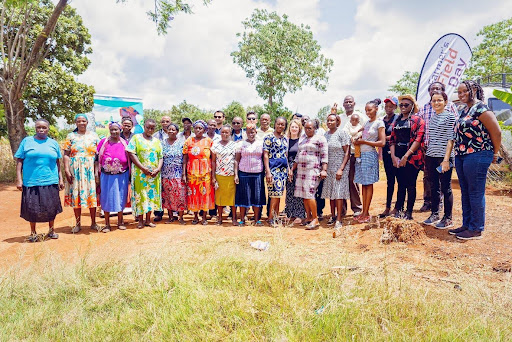The integration of AI into agriculture promises to revolutionize the industry, enhancing productivity, sustainability and resilience. AI-powered tools hold the potential to empower farmers worldwide, particularly in developing countries, enabling them to overcome challenges and thrive. According to the International Food Policy Research Institute, data-driven agriculture techniques could increase farm productivity by up to 67% by 2050, while reducing agricultural and food losses.
As AI continues to progress, its influence on agriculture is poised to deepen, marking a transformative shift across every aspect of farming. This evolution stands as a cornerstone in guaranteeing food security for our expanding global population. The advent of mobile-based information retrieval, coupled with advancements in generative AI, holds the promise of extending these benefits to smallholder farmers. The power of generative AI lies in its capacity to assimilate unstructured information in various formats and present it in a comprehensible manner. This innovative tool seamlessly processes inputs in the form of text, voice or images, delivering essential information to farmers and extension workers. This real-world application underscores the practical impact of AI, translating complex data into actionable insights for those at the heart of our agricultural communities.
AIEP: A Catalyst for Change in Bihar and Kenya
The Agriculture Information Exchange Platform (AIEP) exemplifies the transformative power of AI in agriculture, particularly in regions like Bihar, India, and Kenya. Developed by Deutsche Gesellschaft für Internationale Zusammenarbeit (GIZ) under the FAIR Forward initiative, and funded by the Bill and Melinda Gates Foundation, AIEP brings AI's benefits to the grassroots level. Partners such as CLEAR Global have been instrumental in shaping this platform, ensuring that it addresses the unique challenges of smallholder farmers in these regions. By doing so, AIEP acts as a beacon of hope for the Global South, demonstrating the potential of AI to drive positive change.
Harnessing Cutting-edge Technology for Agriculture
AIEP employs an omni-channel delivery mechanism, utilizing text, voice, and video formats to disseminate information. This makes it accessible on both feature phones and smartphones, ensuring that even farmers with basic mobile devices can benefit. By leveraging technologies such as generative AI, natural language processing (NLP), text-to-speech (TTS), and speech-to-text (STT), AIEP provides hyper-localized, actionable information. This approach bridges the gap left by traditional agricultural extension services, offering tailored guidance that meets the specific needs of smallholder farmers.

Impact on Climate Change Mitigation and Adaptation
AIEP's impact is particularly significant in the context of climate change. In Bihar and Kenya, the platform has proven its ability to support farmers in adapting to and mitigating the impacts of climate change. It provides real-time weather updates, advice on climate-smart agricultural practices, pest and disease management, and sustainable land use techniques. Furthermore, AIEP facilitates access to climate finance, training, and market information, enhancing farmers' resilience to environmental changes. By promoting sustainable agricultural practices and efficient resource management, AIEP not only supports farmers in adapting to current challenges but also contributes to long-term climate change mitigation.
Overcoming Challenges: Building Trust and Capacity
The journey of integrating AI into agriculture is not without challenges. One major hurdle is the need for AI-readable, localized data that is both relevant and easy to understand. This is crucial for the effectiveness of AI solutions but often difficult to achieve. Additionally, shifting farmers from traditional advisory methods to AI-based solutions requires overcoming scepticism and building trust in the new technology.
To address these challenges, AIEP employs a human-in-the-loop approach. Trusted extension workers deliver AI-generated insights to farmers, bridging the trust gap and ensuring the advice is well-received. Collaborations with government entities help to vet and approve advisory content, further enhancing its credibility. AIEP also prioritizes capacity building, training both farmers and extension workers in the use of AI technologies. This approach not only improves skills and confidence but also facilitates a smoother transition to AI-driven agricultural practices.
Conclusion: Paving the Way for a Resilient Future
The Agriculture Information Exchange Platform represents a significant leap forward in agricultural support, combining innovative technology with a commitment to inclusivity and sustainability. By delivering personalized, actionable information through multiple channels and addressing the key challenges of AI adoption, AIEP is transforming agricultural practices in Kenya and India. Its contributions to climate change adaptation and mitigation highlight its potential to drive sustainable agricultural development and improve the livelihoods of smallholder farmers. Through its collaborative efforts and focus on trust and capacity building, AIEP is setting a new standard for agricultural technology solutions, paving the way for a more resilient and sustainable future in agriculture.
Contact details
Christian Merz
Kirti Pandey

